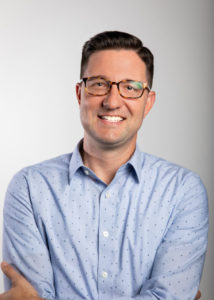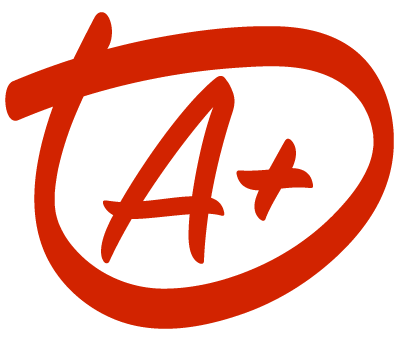Remember back to when you were in school and brought a grade card home.
Let’s say you had three A’s, a B and a C+. Now, imagine the conversation you knew you were about to have with your parent when you got home. Where was the conversation likely to go? What were you told to focus on?
For most of us, the conversation quickly went past the A’s and the B and went right to: “You need to bring up that C+.”
It isn’t that we aren’t excited about the A’s, it’s that our brain is negatively biased, and we can’t help but focus on the weakness.
Focusing on weaknesses is a practice that is killing personal and organizational exceptionalism and keeping us from increasing happiness in our life, our work and our compensation. We should be ignoring our C+ entirely and focusing on our A+.
As a culture, we are obsessed with improving our weaknesses almost as if we are afraid to admit we have any weaknesses at all. Instead, it seems as though we value the idea of a well-rounded person, which is admirable, but people aren’t biologically engineered to be well-rounded.
We are given certain advantages and disadvantages in our DNA. For some of us, source code just makes sense, or some can do complex math problems in their heads. Some can easily dunk a basketball or hit a curve ball, or some of us can just sit down at a piano and play. We may not understand why some things come easy to us, they just do. It is our DNA manifesting itself, and we shouldn’t ignore it.
We Are Not Taught to Be Exceptional; We Are Taught to Be Mediocre
Our culture and primary educational institutions have essentially taught us to spend our time and education to improve our weaknesses in order to meet a floating status quo of mediocrity. If we get an A, we have satisfied that standard, and we should move on to the next weakness to improve. This process of weakness improvement might produce some measurable form of success in building a well-rounded individual, but it is contrary to our biology.
As parents, mentors and business leaders, we need to begin to abandon the “straight A” mentality and focus on finding the A+. The A+ is all that matters. By focusing on what we were biologically engineered to do, we will provide the most value to society, contribute the most to our community, and maximize our wealth and happiness.
Your C+ is unlikely to play a role in your personal or professional future at all. Your A+ will define both.
Like People, Organizations Aren’t Well-Rounded Either
Like you, your organization has its own characteristics in its DNA. Organizations operate similarly to how people operate. After all, organizations are amalgamations of people. They have their own personalities, language, moral code, etc. So organizations aren’t well-rounded either.
What is your organization best at? That is, what is your organization’s A+? In all likelihood, your answer to this question is where you make the most profit, which is not a coincidence.
So why do many organizations create unnecessary capabilities, products and service lines that don’t reinforce core organizational strength? It is the same reason we tend to continually improve our personal weaknesses — the foolish pursuit of being well-rounded.
Just like highly productive and exceptional people, exceptional organizations know their A+, and it shows. These exceptional organizations are typically highly niched, are seen as thought leaders in their respective industries and enjoy market-leading profit margins. They don’t participate in economic downturns or recessions. They attract the best talent, have very little organizational waste and say “no” to opportunities more than they say “yes.”
Creating an Exceptional Organization
Mathematically, it is in your best interest to hyper-focus on your A+ and abandon every other effort. However, just thinking about focusing on one thing is quickly followed by anxiety and fear, so most organizations hang on to every revenue stream possible. The reason is because the human mind has a natural predisposition towards loss aversion. The idea of dropping a product or service line that generates revenue is extremely taxing on our brain, even if the product or service line is losing money. Your brain wants to keep the status quo, even when it is painful and you suspect a low probability of long-term sustainability.
Even though it is painful, in order to build a sustainable and highly profitable organization, you must eliminate all of your weak product and service lines and direct those resources to turning your most promising A into an A+. There are two basic things you need to do to help identify your most promising A:
- Obsess over your financials. Make sure you are itemizing every revenue stream and thoroughly understanding the indirect costs associated with them. Many low-margin lines are allowed to continue because they are evaluated on their faces without understanding the opportunity cost of their efforts. How many great people do you have in low-margin areas? What would happen with the additional capital and labor if you killed a weak line and focused on creating an exceptional line?
- Study your customers and prospects. Your customers will reveal your most promising A and tell you how to turn it into an A+ so you can refine and exploit its full potential in the market. Your prospects will give you a sense of relativity on your direct and indirect competitors and allow you to understand how elastic your pricing can be if you turn an “A” line into an “A+” line.
You must abandon the mindset of straight-A mediocrity and embrace your exceptionalism. Your industry is being more commoditized every day, and it is inevitable that niched competitors will start flanking you and forcing you to compete more on price with each passing year.
The sooner you understand your A+, the sooner you can unleash your personal and organizational exceptionalism on the world.

Grant Gooding is an emotional-data thought leader; speaker; and marketing and neuroscience nerd. He is founder and CEO of PROOF Positioning, a market research firm that specializes in emotional data.

